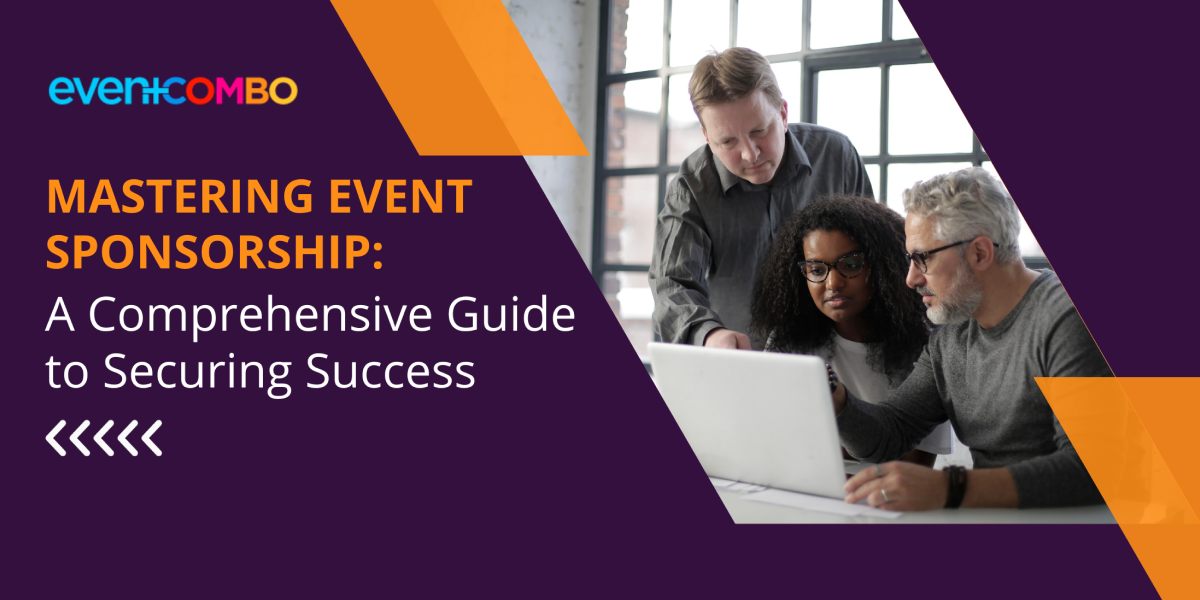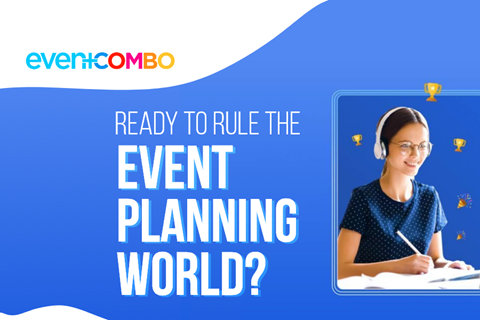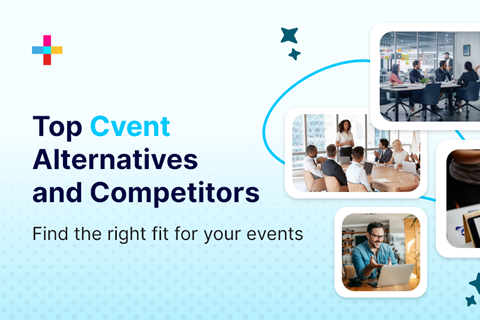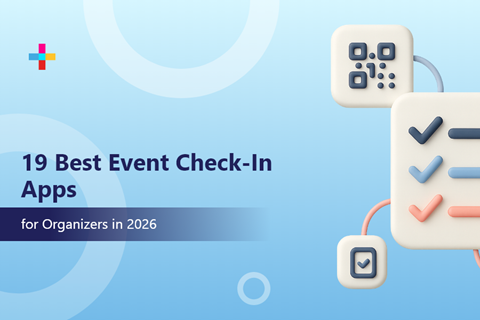

Ever wondered why some events resonate more than others? Why do they stand out with better facilities, impressive line-ups, and even stunning goodie bags? The secret often lies in robust event sponsorships.
A well-matched event sponsorship can redefine the whole event experience. Yet, 90% of B2B event organizers consider securing event sponsorships as their biggest challenge. The reason behind this is there’s a lot of competition in getting event sponsors’ attention. Also, the complexities of aligning with their brand’s vision and goals are equally daunting.
So, how do you get event sponsors? And how can this relationship be leveraged for maximum mutual benefit?
This complete guide to event sponsorship deciphers it all.
Let’s dive in!
What Is Event Sponsorship?
Event sponsorship is a collaboration where a company or individual provides financial or in-kind support for an event in exchange for brand exposure and promotional opportunities. This partnership benefits both parties: the event gains resources for execution, and the sponsor gets visibility and access to a targeted audience.
Why Event Sponsorships Are Important?
Event sponsorships are more than just funds—they are game-changers that can propel your events to new heights. Here are some benefits of event sponsorships that make them non-negotiable for top-tier events:
What Are the Different Types of Event Sponsorship Packages?
An event sponsorship package is a set of offerings that an event organizer presents to potential sponsors. It includes the benefits they will receive in exchange for their support. These benefits can vary widely and often include marketing exposure, opportunities for brand engagement, access to attendee data, speaking slots, and VIP treatment at the event.
A good sponsorship package is all about presentation, precision, and personal touch. It should reflect a deep understanding of what a sponsor seeks and provide real value in return. It's not about a one-size-fits-all approach. Tailoring each package to the unique needs of different sponsors can significantly enhance the appeal.
Here are the three common types of event sponsorship packages and what they typically entail. This will help you select the perfect sponsorship package for your event:
3 Common Mistakes Organizers Make When Reaching Out to Sponsors
Getting sponsors on board isn't a straightforward process, and event organizers often make some mistakes along the way. Let's dive into the common mistakes to avoid while reaching out to sponsors so you can build stronger relationships with them.
5 Tips to Choose the Right Sponsors for Your Event
Choosing the right sponsors is about finding partners who can elevate your event. 75% of event sponsors are actively looking for new partnerships, and it is your time to shine through. Let's explore the effective strategies for event sponsorships and identify sponsors who align with your vision and amplify your message:
1. Understand Your Events
Before seeking sponsorship, you must have a clear understanding of your own event. Knowing its core values, target audience, and unique selling points can make a difference when pitching to potential sponsors. Here's what to focus on:
2. Identify the Right Sponsors
As mentioned above, when choosing sponsors for your event, a true partnership goes beyond just financial support. Think about sponsors as collaborators who bring added value, be it in the form of industry expertise, tools, or marketing reach.
For instance, a tech company might not only sponsor but also provide the latest gadgets for hands-on sessions in your events. Or a renowned brand could boost your event's prestige just by being associated with it. So, while funds are essential, remember to look at the bigger picture.
Here's how to identify the best sponsors for your event
3. Directly Engage with the Decision Makers
Targeting is key in seeking sponsorships. It's important to approach those who actually have the authority to make decisions.
Start by pinpointing the person responsible for sponsorships in your prospective company and then tailor your approach to resonate with their specific interests and concerns.
Mutual connections can be a goldmine; a warm introduction often carries more weight than a cold call or email. And once you've made that connection, don't just stop at the event's horizon. Think long-term and nurture the relationship, as this will pave the way for successful collaborations in the future.
4. Use Online Platforms to Find Sponsors
Finding the right sponsor isn't restricted to traditional outreach. The internet offers a plethora of platforms and tools to connect event organizers with potential sponsors:
By leveraging these online resources, you can streamline your search and increase the chances of securing mutually beneficial sponsorship.
5. Some Other Event Sponsorship Best Practices
7 Steps to Create a Standout Event Sponsorship Proposal
When it comes to securing sponsorships, a top-notch proposal can set you apart. Here are 12 tried-and-true strategies to ensure your proposal grabs attention and convinces potential sponsors of the value you offer:
1. Deep Dive into the Potential Sponsor
When crafting your proposal, start by understanding your potential sponsors. A well-researched and tailored pitch can directly speak to their needs, goals, and preferences, increasing your chances of partnership.
For instance, if a brand's target is enhancing its eco-friendly image, highlight your event's sustainability efforts. It's all about making them see how partnering with you fits perfectly into their broader strategy.
2. Present Them Clear Demographics and Event Statistics
Sponsors want assurance that your event audience aligns with their target market. Make your proposal resonate by highlighting key demographics and event stats.
If you know that 70% of your attendees fall into the age bracket most coveted by a lifestyle brand, share that! Other than that, include details like:
This not only validates your event's potential for exposure but gives sponsors a clear picture of who they'll be reaching. Remember, data-driven insights can play an important role in building trust and excitement.
3. Offer Exclusivity Options
Sponsors love standing out. By offering exclusive rights within their industry at your event, you can give them a clear path to shine brighter than the rest. This uniqueness boosts their brand presence and ensures they get the maximum return on their investment. For many companies, the advantage of being the sole representative of their niche can tip the scales in favor of a collaboration.
4. Highlight Marketing and Media Coverage Opportunities
Visibility is everything in events for sponsors. It's crucial to outline how your event can amplify their brand. Talk about the media partnerships you've secured, the range of promotional activities planned, and the channels you'll be leveraging. This isn't just about a logo on a banner; it's about press releases, feature articles, social media shout-outs, and perhaps a spot in a promotional video. Make them see the vast potential for brand engagement and recognition.
5. Tailor Packages to the Sponsor's Industry or Niche
We have already said that a one-size-fits-all approach rarely works in sponsorships. Instead, tailor your offerings to the specific industry or niche of a potential sponsor. Understand their audience, their goals, and the type of exposure that would benefit them most. If they're a tech company, perhaps they'd value a demo booth. A fashion brand? They might love a runway segment. By showing that you've done your homework and can provide value within their domain, you're more likely to spark genuine interest and partnership.
6. Use Compelling Visuals and Professional Design
First impressions count, especially when you're pitching for sponsorships. A well-designed proposal with compelling visuals speaks volumes about your professionalism and the quality of the event you're organizing. It's not just about aesthetics; it's about effectively communicating your event's potential. Imagine a brand seeing its logo on a mock-up stage or during a highlight reel of your event. By giving them a visual taste of what's possible, you're not just selling an idea; you're offering a concrete vision of the future. So, invest in a good design—it can be the difference between a 'maybe' and a 'yes'.
7. Provide Testimonials from Previous Sponsors
The power of word-of-mouth cannot be understated when it comes to event sponsorships. Including testimonials in your proposal serves a dual purpose: it reassures potential sponsors of your event's value and demonstrates previous successes.
To effectively use testimonials, choose feedback that highlights specific benefits the sponsor enjoyed, be it increased brand visibility or robust attendee engagement. Authentic words from satisfied past sponsors can be the final nudge a potential sponsor needs to get on board.
6 Ways to Ensure Sponsor Exposure Translates into Foot Traffic
Ensuring your sponsors don’t just catch eyes but also compel your attendees to engage and interact on the ground is crucial for the success of your event. Here are some tips to make that conversion happen:
1. Interactive Sponsor Booths or Kiosks
Everyone loves a buzzworthy booth. Usually, in every event, attendees are flooded with visuals, so making a sponsor's booth stand out is essential. By incorporating hands-on demos or interactive tech, you can make sure attendees don't just pass by but stop, engage, and remember your sponsor's brand long after the event ends.
2. Sponsor-Led Sessions or Workshops
When sponsors share their expertise, everyone benefits. It's a golden chance for sponsors to showcase their industry knowledge while attendees get a mix of learning and brand exposure. Such sessions not only offer value but also position the sponsor as a thought leader in their domain.
3. Exclusive Offers or Discounts Linked to the Sponsor
Exclusive offers or discounts tied to sponsors can be a magnetic draw to increase booth visits. Attendees feel like they are getting an exclusive perk of the event, enhancing their overall experience. And for sponsors, it's a direct way to demonstrate their product's value and foster goodwill. Integrating these deals ensures both engagement and a unique brand touchpoint.
4. Gamification or Contests Involving Sponsor Products/Services
Friendly competitions make the events extra memorable. By integrating gamification or contests around a sponsor's products or services, attendees get a chance to engage in a playful manner while getting familiar with what the sponsor offers. It's not just about winning a prize; it's about the excitement, the challenge, and the hands-on experience with the sponsor's brand. This approach turns passive observers into active participants, creating memorable brand interactions.
5. Collaborative Branding on Event Essentials: Lanyards, Badges, Bags
Event essentials like lanyards, badges, and bags are always in plain sight, circulating throughout venues and leaving lasting impressions. Collaborative branding on these items is a brilliant way to keep your sponsors' logos and messages continuously on display. Every photo snapped, handshake exchanged, or swag bag slung over a shoulder amplifies the sponsor's presence.
6. Engaging Attendees Pre-Event Through Joint Webinars or Teasers
Before the curtains even rise on your event, there's a golden opportunity to grab your attendees' attention. Joint webinars or teasers featuring sponsors aren't just promotional tools—they're anticipation builders. These engagements offer a sneak peek, setting the stage for what's to come while simultaneously highlighting the sponsor's pivotal role.
Ready to Unlock the Ultimate Potential of Sponsorships for Your Events?
Throughout this ultimate guide to event sponsorship, we've delved into the complexities of identifying the right sponsors, crafting standout proposals, and ensuring the exposure translates into real, definite benefits. Remember, the essence of a fruitful sponsorship lies not just in the numbers but in the synergy and alignment between the event and the sponsor.
It's crucial to keep an open line of communication with your sponsors, continuously seeking their feedback and iterating on your approach. Each event, big or small, offers a learning curve. Your dedication to fostering better sponsor relationships will not only enhance the quality of your events but also establish your reputation as a reliable and forward-thinking event organizer.
So, gear up, take the insights from here, and propel your next event to greater heights! Connect with our experts 24*7 - https://bit.ly/3R9bkuP

Professional certifications for event planners do more than provide a solid foundation in the field; they offer valuable exposure to the dynamic world of event planning and insights from prominent industry experts.

Choosing the right event management platform is vital for event professionals navigating the growing demand for in person , virtual, and hybrid events. Modern planners need solutions that offer robust features,...

Attendees don't notice good check-in. They only notice bad check-in. And planners know check-in is the first moment where their behind-the-scenes work gets exposed.